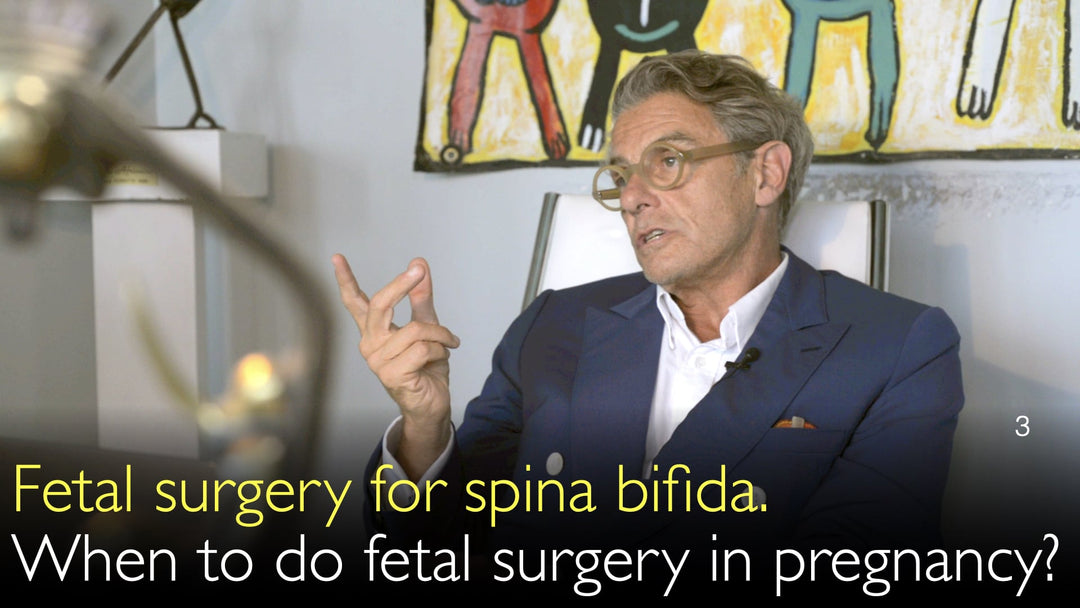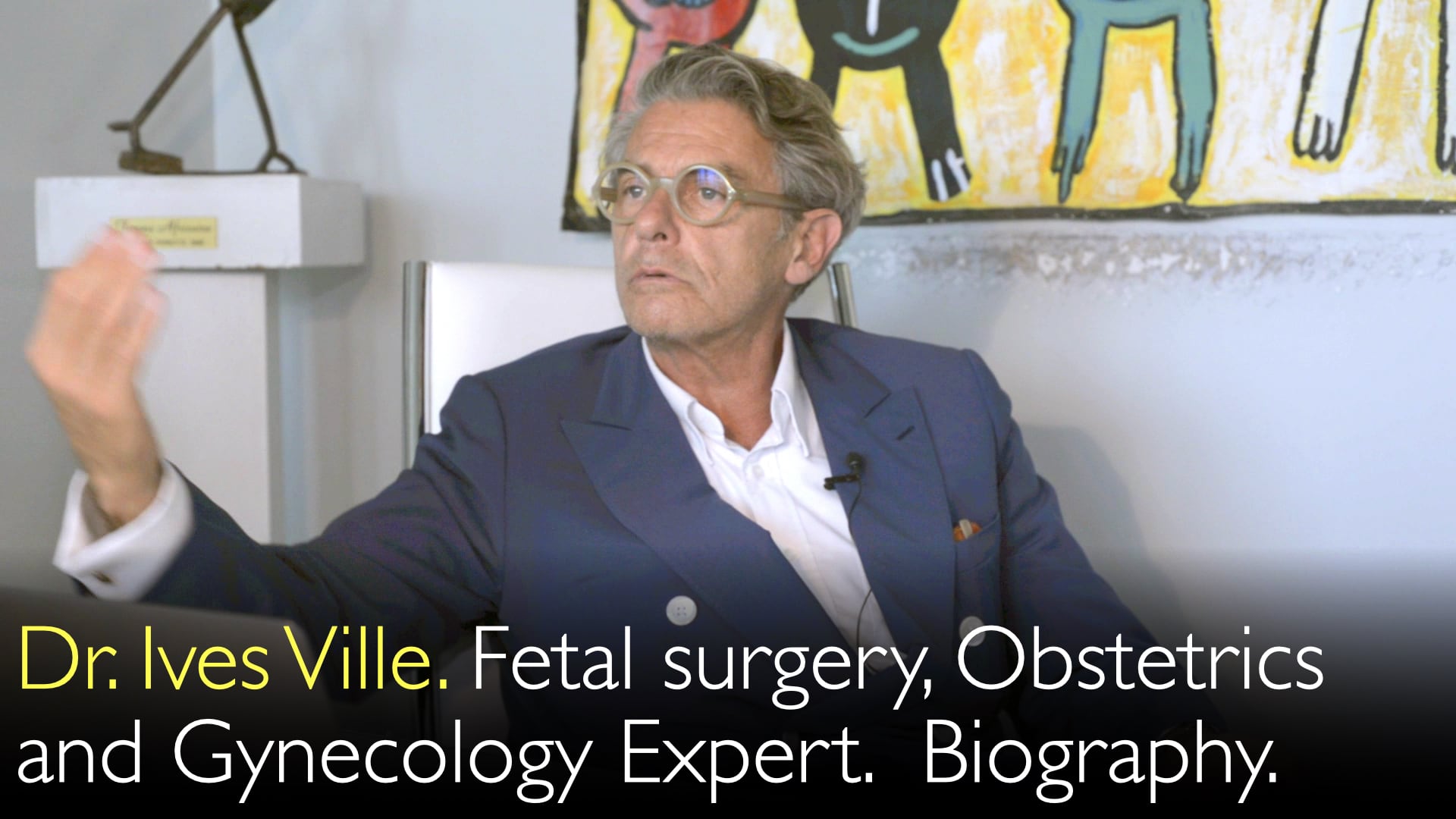Dr. Yves Ville, a leading expert in fetal surgery, explains the benefits and risks of fetal surgery for spina bifida. He elaborates on the two-hit hypothesis of spinal cord injury and describes how intrauterine surgery protects the exposed spinal cord from amniotic fluid. This approach may eliminate the need for extensive postnatal surgery. However, the procedure carries a risk of preterm birth due to membrane rupture. Fetoscopic surgery is optimally performed between weeks 20 and 25 of pregnancy.
Fosterkirurgi ved Spina Bifida: Fordele, Risici og Timing
Spring til afsnit
- To-treffers-hypotesen om rygska-deskade
- Fordele ved fosterkirurgi ved spina bifida
- Risici for for tidlig fødsel og membranruptur
- Optimal timing for fosterkirurgi
- Postoperativ svangerskabspleje og fødsel
- Globale implikationer for behandling af spina bifida
- Fuld transskription
To-treffers-hypotesen om rygska-deskade
Dr. Yves Ville, MD, beskriver to-treffers-hypotesen, som er grundlaget for fosterkirurgi ved spina bifida. Det første træf er selve den medfødte misdannelse, hvor rygmarven er blottet. Det andet træf er den vedvarende eksponering af det ubeskyttede nervevæv for fostervand. Fostervandet er kemisk aggressivt og forværrer skaden på den blottede rygmarv. Denne sekundære skade øger omfanget af læsionen og forringer barnets neurologiske udfald.
Fordele ved fosterkirurgi ved spina bifida
Hovedmålet med fosterkirurgi er at beskytte ryglæsionen mod fostervandets skadelige virkning. Dr. Yves Ville, MD, forklarer, at ved at dække defekten in utero kan man standse denne sekundære skade. En væsentlig fordel er, at mange børn ikke har brug for en større reoperation efter fødslen. Nogle kan eventuelt have behov for en mindre indgreb senere, hvis rygmarven er fastgroet. Denne indgreb giver en reel fordel for familier, der vælger at fortsætte graviditeten.
Risici for for tidlig fødsel og membranruptur
En væsentlig risiko ved fosterendoskopisk kirurgi er for tidlig membranruptur (PTFM). Denne komplikation kan føre til betydelig for tidlig fødsel. Dr. Yves Ville, MD, påpeger, at sammenhængen er kompleks; moderat for tidlig fødsel kan faktisk reducere eksponeringstiden for fostervand. Ekstrem for tidlig fødsel er dog livstruende. Han oplyser, at omkring 15% af fosterne har en klar fordel af operationen. Omvendt kan 5% til 10% ikke drage fordel og potentielt få et dårligere udfald.
Optimal timing for fosterkirurgi
Timingen af fosterkirurgi er afgørende for dens succes og sikkerhed. Dr. Yves Ville, MD, understreger, at det ideelle tidspunkt er midt i graviditeten, mellem uge 20 og 25. Operation for tidligt øger risikoen for komplikationer som membranruptur. Operation for sent, efter uge 30, giver ringe fordel, da skaden kan være uoprettelig. På det tidspunkt er det ofte bedre at planlægge fødsel og udføre postnatal kirurgi i stedet.
Postoperativ svangerskabspleje og fødsel
Dr. Yves Ville, MD, fremhæver en nøglefordel ved endoskopisk versus åben fosterkirurgi: den postoperative pleje. Efter en endoskopisk procedure er svangerskabsplejen ikke væsentligt anderledes. Moderen behøver ikke at forblive indlagt kontinuerligt og kan ofte vende hjem. Derudover er vaginal fødsel stadig en mulighed. Dette står i skarp kontrast til åben fosterkirurgi, som altid nødvendiggør kejsersnit, selv hvis fødselen begynder meget tidligt.
Globale implikationer for behandling af spina bifida
Dr. Yves Ville, MD, diskuterer den globale betydning af denne minimalt invasive tilgang. I udviklingslande kan adgangen til omgående, kompleks postnatal kirurgi være begrænset. Ved at udføre operationen in utero kan barnet fødes hvor som helst, selv i et fjernt område, uden umiddelbar risiko. Dette er afgørende i regioner, hvor perinatal infektion før eller efter postnatal kirurgi er en stor bekymring. Fosterkirurgi kan derfor give en vital behandlingsmulighed på verdensplan.
Fuld transskription
Dr. Anton Titov, MD: Spina bifida kan diagnosticeres hos ufødte børn. Du har allerede nævnt noget af det. Du er ekspert i fosterkirurgi og in utero-endoskopisk kirurgi. Fosterkirurgi kan udføres på et ufødt barn med spina bifida, hvilket, som du allerede har nævnt, ikke fjerner spina bifida. Der er dog visse indikationer for fosterkirurgi ved spina bifida. Vil du venligst sammenfatte fordele og risici ved at udføre den endoskopiske fosterkirurgi, når spina bifida opdages før barnets fødsel?
Dr. Yves Ville, MD: Fordelen ved intrauterin kirurgi ved spina bifida er, at man forhindrer den skadelige effekt af fostervandets aggressivitet på den blottede rygmarv, udover selve misdannelsen. Fordi fosterets rygmarv ikke er beskyttet af knogler eller hud. Fostervandet er ret aggressivt over for denne rygmarv. Det forværrer læsionen og dens virkning.
Det kaldes to-treffers-hypotesen. Den ene er misdannelsen. Den anden er aggressiviteten eller toksiciteten af fostervandet på ryglæsionen. Så man hjælper ved at beskytte ryglæsionen. Mange af disse børn behøver ikke at blive reopereret efter fødslen, eller nogle gange har de en fastgroet rygmarv. Og så er det en mindre operation end den fulde spina bifida-reparation.
Så det er primært for at forebygge den fostervandsrelaterede morbiditet. Og det er sandsynligvis grunden til, at effekten af intrauterin kirurgi ikke er så stor sammenlignet med postnatal kirurgi. Men det hjælper. Så for kvinder, der ønsker at fortsætte graviditeten og ikke overvejer svangerskabsafbrydelse, kan fosterkirurgi være en hjælp.
Ulempen er risikoen for for tidlig fødsel på grund af membranruptur. Som ved al endoskopisk kirurgi, hovedsagelig, og derfor risici for for tidlig fødsel. Men for tidlig fødsel ved spina bifida er et åbent spørgsmål. Bortset fra ekstremt for tidlig fødsel, som er livstruende, kan moderat for tidlig fødsel have en positiv effekt, fordi barnet også er mindre eksponeret for fostervand.
Sammenhængen mellem alt dette er ikke særlig klar. Men grundlæggende ønsker man at fortsætte sin graviditet. Og man ønsker at opnå den lille fordel, som for 15 procent af fosterne synes at drage af intrauterin kirurgi. Derimod drager omkring fem til 10% af foster med spina bifida ikke fordel af fosterkirurgi og bliver værre. Så balancen er ret fin at finde.
Dr. Anton Titov, MD: Hvad er den typiske timing for spina bifida-kirurgi i forhold til graviditeten? Hvor meget tid går der normalt, før babyen fødes efter fosterendoskopisk kirurgi?
Dr. Yves Ville, MD: For al fosterkirurgi er der to faser. For tidligt, og man får en meget høj rate af komplikationer som membranruptur. Så man skal udføre fosterendoskopisk kirurgi omkring midt i graviditeten, mellem uge 20 og 25, er det rigtige tidspunkt. Og det gælder for al kirurgi.
Det er, når livmoderen er mere tolerant over for instrumenternes aggression. Og det er også, når læsionerne sandsynligvis ikke er så irreversible, eller endnu ikke på et stadie, hvor der ikke kan forventes forbedring. Det vil ikke give mening at operere et foster ved uge 30 af graviditeten, for eksempel, for enhver fosterkirurgi. Det er bedre at føde babyen eller babyerne og udføre kirurgi efter fødslen eller bare redde dem fra twin-to-twin transfusion, for eksempel.
Så forsøget er at bære graviditeten i yderligere essentielt ti uger. Så det er, hvad man forventer, en god to måneder in utero for at vokse, modnes og ikke blive eksponeret for læsionerne.
Dr. Anton Titov, MD: Adskiller svangerskabsplejen efter uterinkirurgi og fosterkirurgi sig væsentligt i disse ti uger? Så hvad er gennemsnittet?
Dr. Yves Ville, MD: Nej, normalt er det en fordel ved endoskopisk kirurgi over åben uterinkirurgi. Hvis man udfører åben kirurgi, er der ingen anden vej end kejsersnit, selv hvis denne kvinde får fødselsveer meget tidligt i gestationen. Hvorimod hvis man opererer endoskopisk, kan hun føde normalt eller i det mindste vaginalt når som helst. Og plejen er ikke anderledes.
Så man behøver ikke at forblive kontinuerligt på hospitalet. Man kunne være hjemme og have en sædvanlig obstetrisk opfølgning. Ikke når den fosterendoskopiske kirurgi er en one-shot ting. Hvis man tænkte på, hvad vi diskuterede om diafragmahernie med en ballon, der obstruerer luftrøret, så kan denne baby ikke fødes hvor som helst.
Babyen skal fødes et sted, enten ideelt efter fjernelse af ballonen in utero. Eller det er nødvendigt at fjerne ballonen ved fødslen af et meget erfarent hold. Så det er en helt anden sag. Men spina bifida-babyen kunne fødes i en baghave, det er ikke et problem, hvilket kan være en fordel for udviklingslande, fordi dette er et globalt problem.
Og i nogle lande, hvor postnatal kirurgi af denne tilstand eksponerer for perinatal infektion før og efter kirurgi efter fødslen. Det kan være en god ting, at disse børn opereres, før de fødes. Det er en meget vigtig pointe.
Dr. Anton Titov, MD: Tak.





